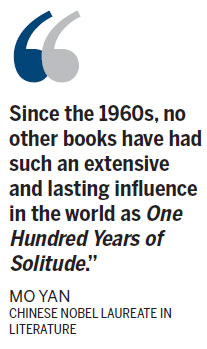Gabriel Garcia Marquez, who died on Thursday at the age of 87, was arguably the most-read contemporary foreign writer in China in more than three decades.
In the early 1980s, his works triggered a new literary trend - the root-searching school of writing - and since then he has become an icon for his readers.
Chinese Nobel laureate in literature Mo Yan, once known as the "Chinese Garcia Marquez", is among his fans. Mo said he has tried to escape the Spanish-language writer's influence for 20 years.
"Since the 1960s, no other books have had such an extensive and lasting influence in the world as One Hundred Years of Solitude," Mo told Tencent Culture on Thursday.
Garcia Marquez was a talented writer who created a unique style "that made him immortal", Mo said.
When giving his Nobel Lecture on Dec 7, 2012, Mo said he was "encouraged by the bold, unrestrained way Garcia Marquez and William Faulkner created new territory in writing, and learned from them that a writer must have a place that belongs to him alone".
"I followed in the footsteps of these two masters before realizing that I had to escape their influence," he added.
Yang Ling, of Capital Normal University, who translated Garcia Marquez's Love in the Time of Cholera, said readers were astounded by the way in which "a writer can tell stories like this".
Veteran writer Mai Jia recalled when he first read the works of Garcia Marquez, saying, "His works are like delicacies to a hungry man."
Writer and literary critic Xu Zechen said: "Everyone was reading his works. According to one joke, without mimicking his style, Chinese writers seemingly don't know how to begin their own stories."
Xu believes Garcia Marquez liberated the Chinese literary imagination and ushered in a new world for writers.
"He refreshes the sense of space and time. These are basics to writing. In short, we borrowed handy tools from the master," he said.
Chen Zhongyi, a leading Spanish-language scholar at the Chinese Academy of Social Sciences, said there are historical reasons for the Chinese love of Garcia Marquez.

"Being a Latin American writer from Colombia, when first translated into Chinese, Garcia Marquez belonged to neither of the two sides in the Cold War, but he gained respect and recognition from both," Chen said.
"They saw hope from him that writers from a developing country can go that far."
Garcia Marquez visited China in 1990 but was reluctant to authorize books to Chinese publishers because of rampant piracy.
After the mid-1990s, the situation began to change when China joined international copyright conventions.
Li Yao, editor at Thinkingdom Media Group, told China Daily, "Publishing Garcia Marquez in China has become a dream for publishers. We finally made it in 2011."
According to Li, the seven titles the group has published have sold 4 million copies, with One Hundred Years of Solitude selling 2.6 million in more than two years.
Modern Press said its Chinese-language version of Ilan Stavans' biography Gabriel Garcia Marquez: The early years 1927-1970, has sold 50,000 copies.
Chen, the veteran scholar, said that with Marquez's death, a great tradition may fade away.
Chen was referring to "creative inheritance of national tradition" for which Garcia Marquez sets a perfect sample, with the influence spreading to Chinese writers like Mo Yan.
|
Colombian Nobel Prize laureate Gabriel Garcia Marquez, who died on Thursday at the age of 87, listens to a speech during a journalism awards ceremony in Monterrey, Mexico, in October 2007. Marquez's beguiling stories of love and longing brought Latin America to life for millions of readers. Tomas Bravo / Reuters |
(China Daily 04/19/2014 page1)